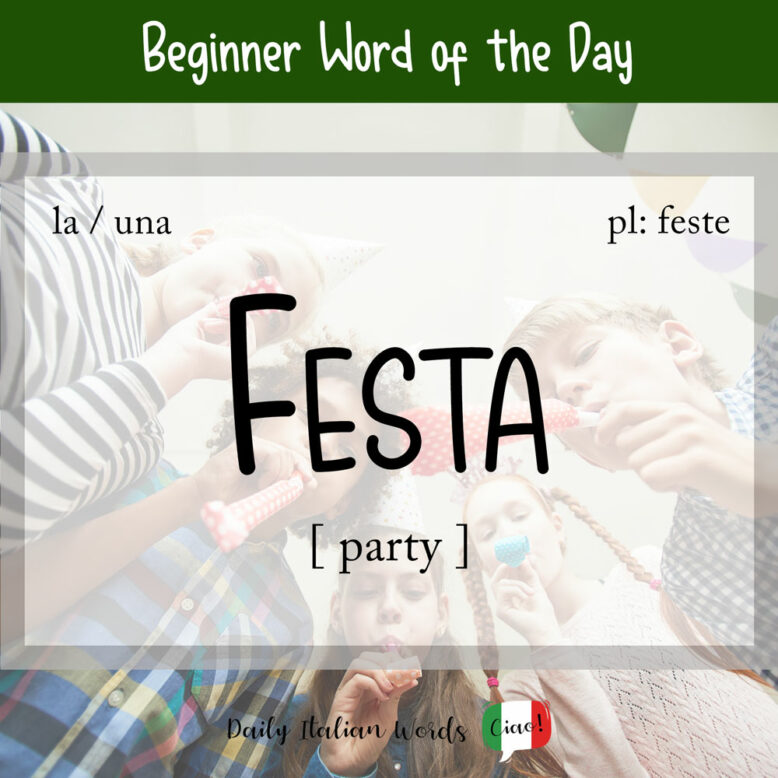Are you a party-goer? Then you’re going to love today’s word of the day!
The word festa can mean a number of things in English, but one of the first translations you’ll certainly come across when living in Italy is party or celebration.
festa
party

- festa di compleanno = birthday party
- festa di Natale = Christmas party
- festa di Capodanno = New Year’s party
- festa di matrimonio = wedding celebration
Ho ricevuto un invito ad una festa.
I received an invitation to a party.
Festa can also be used to describe extended periods of celebration, festivals or special days of commemoration.
- festa della birra = beer festival
- festa della musica = music festival
- festa di paese = town festival
- Festa della Repubblica = Republic Day / Italian National Day
- La Festa della Mamma = Mother’s Day
Non dimenticarti che domani è la festa della mamma!
Don’t forget that tomorrow is Mother’s Day!

Finally, it can be used in reference to a holiday or day off work.
- festa nazionale = national holiday
- giorni di festa = holidays
Oggi mi sono preso un giorno di festa. Ne avevo proprio bisogno.
Today I took a day off. I really needed it.
Festa can be transformed into the verb to party/celebrate by placing fare in front. An alternative is to use the actual verb festeggiare.
Ho l’intenzione di fare festa fino a notte fonda.
I plan to party until late at night.
The word festa appears within a number of nouns and adjectives related to partying and celebrating, such as:
- festoso = merry, in festive spirits (often used to describe friendly dogs that happily come up and greet you)
- festaiolo = a party animal, someone who often hosts parties, or someone who is fun-loving and festive
- festeggiamento = celebration, festivity, merrymaking
- festività = festivity
- festeggiato/a = a guest of honour, birthday boy/girl
- festone = garland

The adjective festivo is often used as an alternative to festa to describe non-working days or holidays.
- giorno festivo = public holiday
- giorni festivi = holidays
- turno festivo = holiday shift (at work)
Finally, festa can be used in a negative way with the verb fare (to do) or conciare (to thrash): fare la festa (a qualcuno) or conciare (qualcuno) per le feste. Either can mean an act of violence or damage towards someone or something.
Se non rimedi a questa situazione, quei tipi ti conceranno per le feste.
If you don’t find a solution, those guys will give you a thrashing.
The expression fare le feste has a positive connotation too. It is often used to describe a dog’s happiness when its owner comes home.
Guarda quante feste fa questo cane al suo padrone.
Look at how happy this dog is to see its owner.
Heather Broster is a graduate with honours in linguistics from the University of Western Ontario. She is an aspiring polyglot, proficient in English and Italian, as well as Japanese, Welsh, and French to varying degrees of fluency. Originally from Toronto, Heather has resided in various countries, notably Italy for a period of six years. Her primary focus lies in the fields of language acquisition, education, and bilingual instruction.


